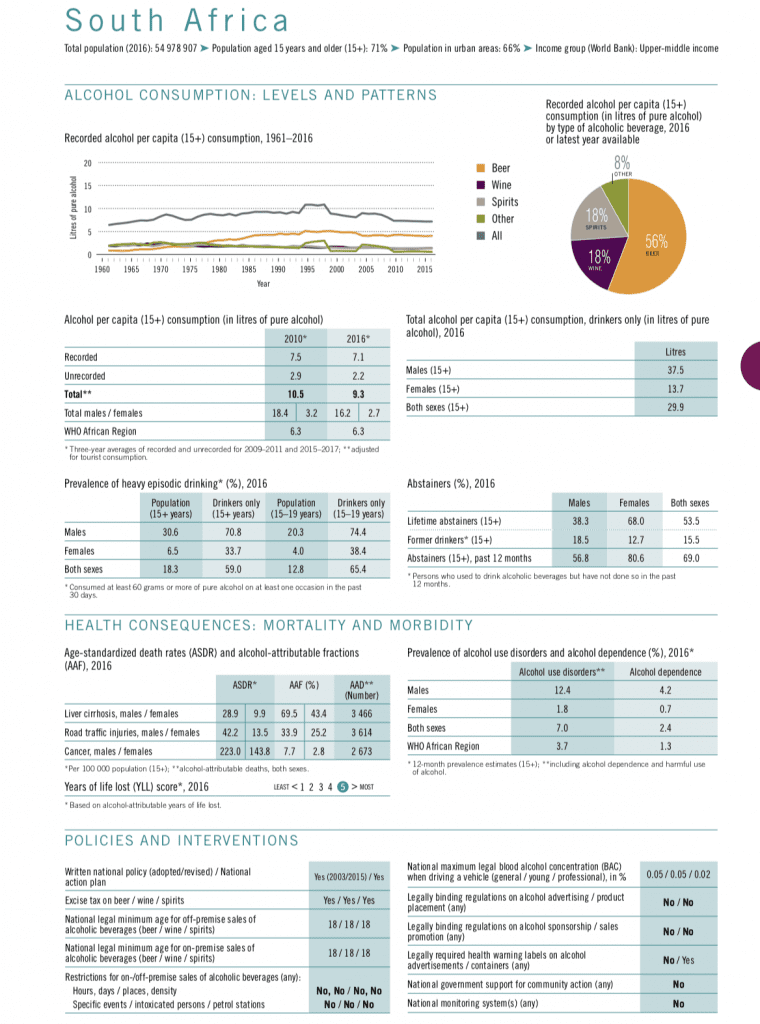Minister Mbalula called for a review of current alcohol laws as a large number of South Africans die each month from road crashed due to driving under the influence, as well as other alcohol related injuries, diseases and crimes.
South African police report that in 2019 alone there were 86,160 cases of motorists driving under the influence of alcohol or other drugs. The Western Cape region accounted for 12,776 of these.
According to the World Health Organization (WHO) those who consume alcohol in South Africa consume 29.9 litres of pure alcohol per person each year. This is a high figure placing South Africa at the fifth highest alcohol using population globally.
As a country, we need to review our laws on the access of alcohol,” said Fikile Mbalula, South African Minister of Transport, as per Cape Business News.
We need to address this as it continues to kill our people on roads and everywhere.”
Fikile Mbalula, Minister of Transport, South Africa
The minister said alcohol is too widely available and there was over-supply of alcohol which is fuelling harm across the country.
The recent alcohol sales ban in South Africa to contain and limit the spread of the coronavirus in South African communities has shown that the country can effectively and efficiently implement alcohol policy solutions for better public health. But there remains massive obstacles, as Mrs Aadielah Maker Diedericks, a social justice and public health advocate and the regional coordinator of the Southern African Alcohol Policy Alliance (SAAPA), in a recent opinion article on Movendi International’s Global Voices blog portal.
Alcohol harm and policy in South Africa
South Africa is heavily burdened by pervasive alcohol harm and South Africa is also being exploited by an alcohol industry that seeks to profit from the country’s “emerging” market with its huge population of young people and growing middle-class. While there are opportunities for and benefits of better alcohol prevention and control, there is also heavy opposition and interference of the alcohol industry.
South Africa has three draft Bills waiting for adoption that would vastly improve the regulation of the alcohol trade, marketing, and availability, according to Mrs. Diedericks Maker.
- Draft Control of Marketing of Alcoholic Beverages Bill of 2013,
- Draft Traffic Amendment Bill of 2015 (providing for reduced BAC limit),
- Draft Liquor Amendment Bill of 2017 (providing for increased age to 21 years; 100m radius limitation of trade around educational and religious institutions; banning of social and small media; a liability clause).
A commissioned study by NEDLAC, the economic chamber of government by Genesis Analytics in 2017 confirmed the public health arguments for better alcohol legislation. Stronger alcohol control would be beneficial for the overall health of the population. The report provides strong and clearly-reasoned evidence that adoption of the proposed national Liquor Amendment Bill of 2017, with specific reference to the provisions related to restricting advertising, increasing the legal alcohol consumption age to 21 years, changing licensing requirements and extending liability to manufacturers, depending on Low versus High impact, will result in:
- A decline in tax revenue of between R 0.3b and R 1.1b,
- A saving in government spending of between R 0.7b and R 1.9b (including savings on government spending on public health of between R 0.3b and R 0.73b), and
- At least 185 lives would be saved a year as a result of a projected 3% reduction in alcohol-related road traffic fatalities, as well as a reduction in HIV transmission, crime, violence, and gender-based violence.
The question, therefore, is why the South African government has not acted until now? Another question is whether the commitment of Transport Minister Mbalula is enough to withstand alcohol industry interference and see the alcohol legislation improvements through?

According to the WHO Global Alcohol Status Report 2018, South Africa ranks among the countries with the most years of life lost due to alcohol. Total alcohol consumption in South Africa is significantly higher than the regional average in Africa – despite the fact that 69% of South Africa’s adult population lives free from alcohol.
Alcohol related deaths from liver cirrhosis, cancer and road traffic injuries are very high and the prevalence of alcohol use disorders in South Africa is almost double the regional average.
The last time South Africa updated its national alcohol policy was in 2015 and vast gaps remain as the WHO country profile shows.
- No regulation of alcohol available,
- No regulation of alcohol advertising, sponsorship and promotions,
- No monitoring system, and
- No community support for action on alcohol prevention and control.
This overview shows that there is vast room for improvement and an urgent need to develop and implement better alcohol policy solutions in South Africa to address the current alcohol burden and use alcohol policy as catalyst to reach health and development for all South Africans.